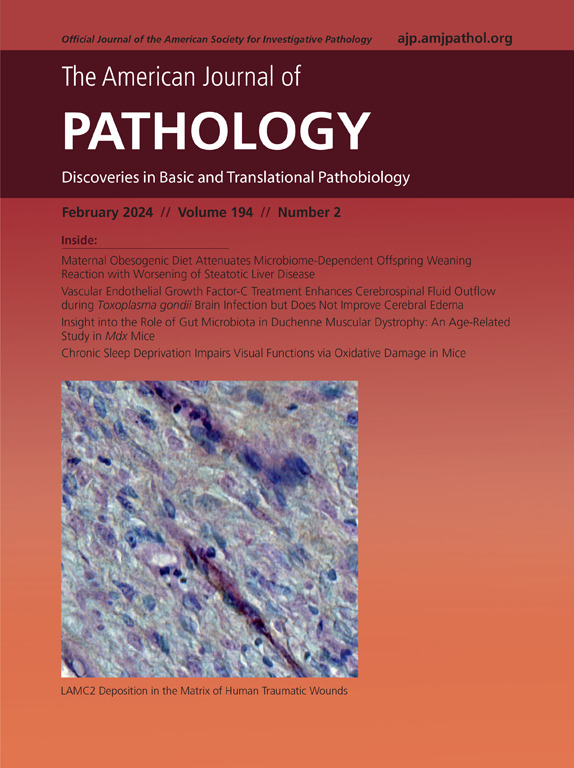Cardiac Atrophy, Dysfunction, and Metabolic Impairments
IF 3.6
2区 医学
Q1 PATHOLOGY
引用次数: 0
Abstract
Muscle atrophy and weakness are prevalent features of cancer. Although extensive research has characterized skeletal muscle wasting in cancer cachexia, limited studies have investigated how cardiac structure and function are affected by therapy-naive cancer. Herein, orthotopic, syngeneic models of epithelial ovarian cancer and pancreatic ductal adenocarcinoma, and a patient-derived pancreatic xenograft model, were used to define the impact of malignancy on cardiac structure, function, and metabolism. Tumor-bearing mice developed cardiac atrophy and intrinsic systolic and diastolic dysfunction, with arterial hypotension and exercise intolerance. In hearts of ovarian tumor–bearing mice, fatty acid–supported mitochondrial respiration decreased, and carbohydrate-supported respiration increased—showcasing a substrate shift in cardiac metabolism that is characteristic of heart failure. Epithelial ovarian cancer decreased cytoskeletal and cardioprotective gene expression, which was paralleled by down-regulation of transcription factors that regulate cardiomyocyte size and function. Patient-derived pancreatic xenograft tumor–bearing mice show altered myosin heavy chain isoform expression—also a molecular phenotype of heart failure. Markers of autophagy and ubiquitin-proteasome system were upregulated by cancer, providing evidence of catabolic signaling that promotes cardiac wasting. Together, two cancer types were used to cross-validate evidence of the structural, functional, and metabolic cancer-induced cardiomyopathy, thus providing translational evidence that could impact future medical management strategies for improved cancer recovery in patients.
心肌萎缩、功能障碍和代谢损伤:癌症诱发的心肌病表型。
肌肉萎缩和虚弱是癌症的普遍特征。虽然已有大量研究描述了癌症恶病质中骨骼肌萎缩的特征,但对治疗无效癌症如何影响心脏结构和功能的研究却很有限。在这里,我们使用了上皮性卵巢癌(EOC)和胰腺导管腺癌(PDAC)的同种异体模型以及源自患者的胰腺异种移植模型(PDX)来确定恶性肿瘤对心脏结构、功能和新陈代谢的影响。罹患肿瘤的小鼠会出现心脏萎缩以及内在的收缩和舒张功能障碍,并伴有动脉低血压和运动不耐受。在卵巢肿瘤小鼠的心脏中,脂肪酸支持的线粒体呼吸减少,而碳水化合物支持的呼吸增加--显示出心脏代谢中的底物转移,这是心力衰竭的特征。EOC降低了细胞骨架和心脏保护基因的表达,同时还下调了调节心肌细胞大小和功能的转录因子。PDX肿瘤小鼠的肌球蛋白重链同工酶表达发生改变,这也是心力衰竭的分子表型。癌症上调了自噬和泛素-蛋白酶体系统的标记物,为促进心脏衰竭的分解代谢信号提供了证据。我们用两种癌症类型交叉验证了癌症诱发心肌病的结构、功能和代谢证据,从而提供了可影响未来医疗管理策略的转化证据,以改善癌症患者的康复。
本文章由计算机程序翻译,如有差异,请以英文原文为准。
求助全文
约1分钟内获得全文
求助全文
来源期刊
CiteScore
11.40
自引率
0.00%
发文量
178
审稿时长
30 days
期刊介绍:
The American Journal of Pathology, official journal of the American Society for Investigative Pathology, published by Elsevier, Inc., seeks high-quality original research reports, reviews, and commentaries related to the molecular and cellular basis of disease. The editors will consider basic, translational, and clinical investigations that directly address mechanisms of pathogenesis or provide a foundation for future mechanistic inquiries. Examples of such foundational investigations include data mining, identification of biomarkers, molecular pathology, and discovery research. Foundational studies that incorporate deep learning and artificial intelligence are also welcome. High priority is given to studies of human disease and relevant experimental models using molecular, cellular, and organismal approaches.

 求助内容:
求助内容: 应助结果提醒方式:
应助结果提醒方式:


